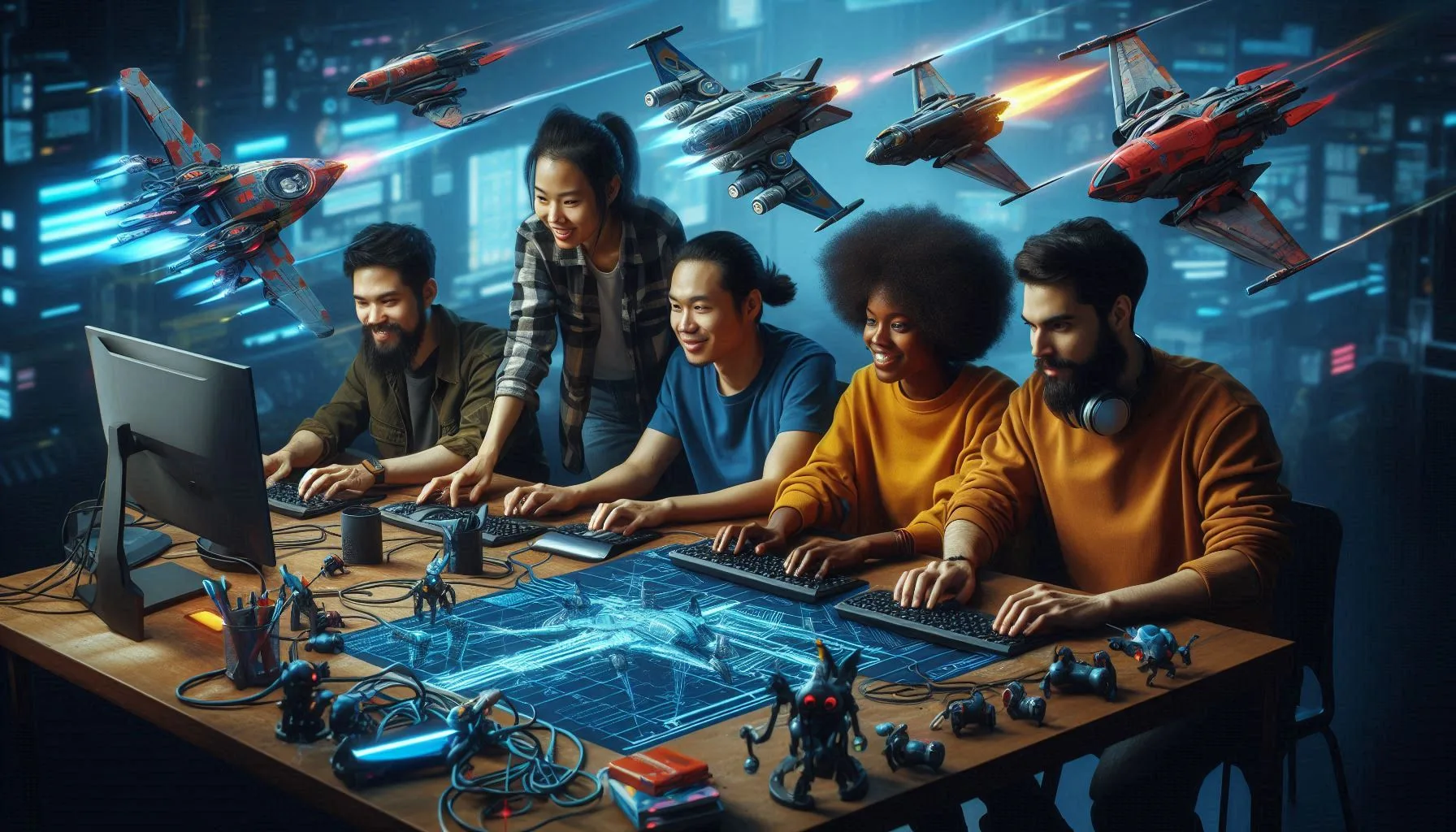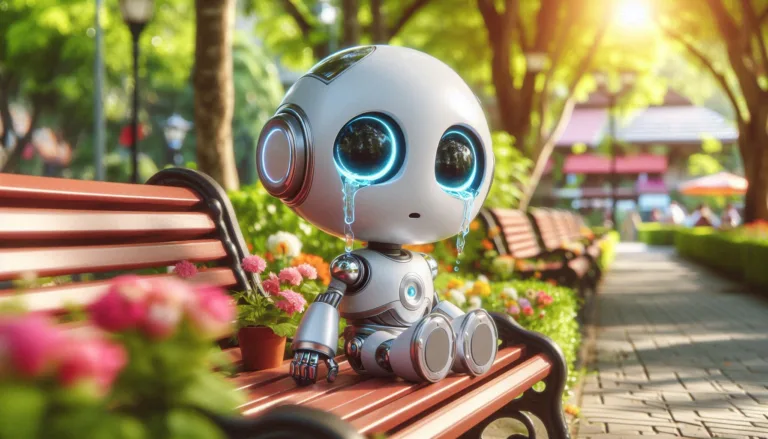Artificial Intelligence (AI) has fundamentally changed how we interact with technology, and the gaming industry is no exception. From smarter opponents to complex game worlds, AI is playing a more dynamic role in shaping both the development and playability of video games. But can AI create entirely new games? How does it influence modern game engines, such as Unreal Engine 5? And what is the potential of games that allow you to interact with AI in real-time?
This article explores the evolving role of AI in game development, highlights new technological advances like Unreal Engine 5, and looks at games where AI-powered conversations and gameplay create a revolutionary experience.
AI’s Traditional Role in Gaming
For decades, AI in gaming has been associated primarily with improving non-player characters (NPCs) and providing more intelligent opponents. Games like Chess, Go, and early real-time strategy (RTS) titles were among the first to use AI to challenge human intellect. AI opponents in these games rely on algorithms to predict moves, making gameplay more strategic.
However, today’s AI systems go far beyond simple opponent algorithms. Developers now leverage AI for procedural generation, dynamic gameplay adjustments, and interactive storytelling. The role of AI in gaming is no longer just about creating smarter opponents; it’s about transforming how games are made and experienced.
Can AI Create Games from Scratch?
The idea of AI independently creating a full-fledged game is still in its infancy. While AI has not yet reached a level where it can conceptualize and design games without human intervention, it is a crucial assistant in game development. AI is particularly useful in tasks such as generating environments, optimizing gameplay mechanics, and automating repetitive processes, allowing game designers to focus on creativity and storytelling.
A prime example of AI’s role in development is procedural content generation (PCG). This method allows AI to automatically create content like levels, maps, and game environments based on rules set by developers. A standout case of this is No Man’s Sky, where the game’s universe—featuring 18 quintillion planets—was generated by algorithms, offering players an endless exploration experience without manual input for each location.
Unreal Engine 5: Powering AI-Enhanced Game Development
Unreal Engine 5 (UE5) has become a pivotal tool in modern game development, offering developers advanced tools and frameworks to incorporate AI in various ways. While Unreal Engine 5 does not feature a standalone AI system, it provides developers with a powerful platform for creating AI-driven mechanics and features. Here’s how Unreal Engine 5 supports AI in game development:
- Behavior Trees: One of the core tools for AI in Unreal Engine 5 is the behavior tree system. Behavior trees allow developers to create complex AI decision-making processes, where NPCs react dynamically to player actions or changes in the game environment. This leads to smarter, more responsive AI characters.
- Navigation Systems: Unreal Engine 5 also supports robust navigation systems powered by AI. Using navigation meshes (NavMesh), AI-driven characters can find paths through complex environments, avoid obstacles, and navigate dynamically changing game worlds. This is crucial for open-world games or action titles with intelligent enemies and allies.
- MetaHuman Tool: While MetaHuman isn’t an AI system itself, it leverages machine learning to generate hyper-realistic human characters. With advanced facial animations and body movements, MetaHuman characters can be paired with AI systems to make NPCs feel more alive. Imagine engaging in conversations with a character whose facial expressions and movements are powered by machine learning!
- Procedural Content Generation (PCG): Developers can use AI within Unreal Engine 5 for procedural content generation, helping to automate the creation of environments, levels, or assets. This allows for massive, dynamic game worlds without requiring developers to handcraft each individual element.
- Third-Party AI Integrations: Unreal Engine 5 offers compatibility with various AI and machine learning tools, allowing developers to bring in custom AI features. This can range from AI-powered dialogue systems to machine learning models that control in-game weather, NPC behavior, or even entire game economies.
Conversational AI: Chatbots in Games
One of the most exciting advancements in AI gaming is the ability to engage with in-game characters through conversational AI. This technology allows players to interact with NPCs in real-time, using natural language instead of pre-programmed dialogue choices. These AI-powered conversations open up new dimensions of immersion and playability.
Games Using Conversational AI
- AI Dungeon: One of the most well-known games using conversational AI is AI Dungeon. It utilizes OpenAI’s GPT-3 model to generate storylines and interact with the player. The AI doesn’t follow a fixed script; instead, it builds the narrative based on your inputs, creating a limitless number of unique gameplay experiences.
- The Uncanny Valley: Another experimental title, The Uncanny Valley, uses AI to power NPC conversations. Unlike traditional games, where NPC responses are pre-programmed, this game allows for dynamic conversations where the AI interprets the player’s words in real-time, leading to more realistic interactions.
- Upcoming Games: Rumors suggest that upcoming titles like The Elder Scrolls VI may incorporate conversational AI to take NPC interactions to the next level, allowing players to talk with characters in ways that feel less scripted and more natural.
- Playing Games with AI: Virtual Companions and Chatbots
In addition to AI enhancing game development, AI is now being integrated into gameplay itself. AI companions, for example, are becoming more advanced, moving beyond simple sidekick roles to fully interactive, intelligent teammates. Games like The Last of Us Part II feature companions who can assist players in combat and even adapt their strategies based on the evolving situation.
With Unreal Engine 5’s support for AI and natural language processing, future games could feature AI companions that not only fight alongside you but can also engage in meaningful conversations, help you with strategies, or adapt to your preferences and playstyle.
AI in Real-Time Strategy Games
Real-time strategy (RTS) games have long relied on AI to create challenging opponents. However, modern RTS games are taking AI a step further. With AI learning systems like those used by OpenAI’s Five to master Dota 2, AI opponents are becoming increasingly capable of adapting to human strategies, offering a level of competition that is almost on par with expert players.
Unreal Engine 5 and AI: The Future of Immersive Gaming
Unreal Engine 5 offers game developers an unprecedented level of control when it comes to integrating AI into both game development and gameplay. Here’s a closer look at how AI and Unreal Engine 5 are paving the way for more immersive gaming experiences:
- Realistic NPCs with MetaHuman: MetaHuman, a tool within Unreal Engine 5, enables the creation of incredibly lifelike human characters. When combined with AI, these characters can respond dynamically to player actions, making the world feel alive. In the future, these AI-driven characters might have the ability to converse with players, learn from their actions, and adapt over time.
- Dynamic World Generation: With Unreal Engine 5’s support for procedural content generation, entire game worlds can be created and modified by AI. Developers can use AI algorithms to generate complex environments that change in real-time based on player input, making each playthrough unique.
- AI-Powered Gameplay Systems: In addition to NPCs and world-building, Unreal Engine 5 supports AI in managing complex gameplay systems. AI can be used to control everything from weather patterns and crowd behaviors to in-game economies and story progression, making the world feel more reactive and responsive.
The Future: AI as Game Creators?
While AI currently assists developers by generating content, managing NPC behaviors, and optimizing gameplay, the possibility of AI becoming the primary creator of games is still on the horizon. AI can’t yet design a full-fledged game from scratch, as creativity and conceptualization still largely depend on human input. However, as AI continues to evolve, we may one day see entirely AI-created games—games where the storyline, world, and characters are generated entirely by algorithms, leaving players to explore endless possibilities.
Conclusion: AI has already revolutionized how games are developed and played. From the advanced tools of Unreal Engine 5 to the emergence of conversational AI in games, artificial intelligence is no longer just a background technology—it is at the heart of the gaming experience. As AI continues to advance, we can expect even more groundbreaking developments in the way games are created and experienced. Whether it’s procedural content generation, dynamic world-building, or real-time conversations with NPCs, AI is pushing the boundaries of what’s possible in gaming.




